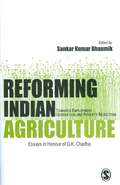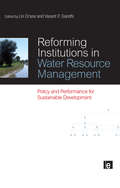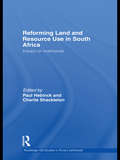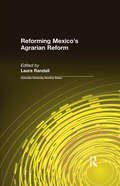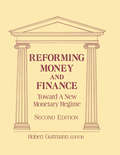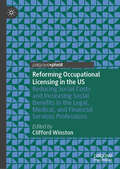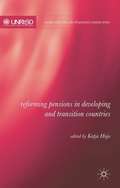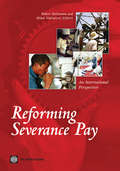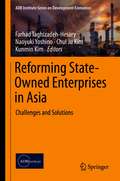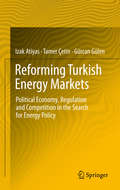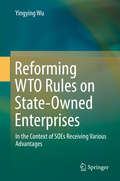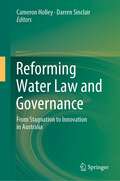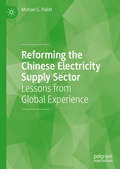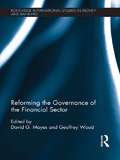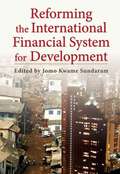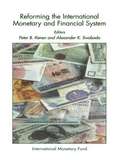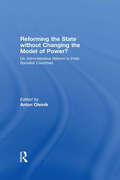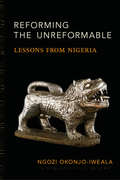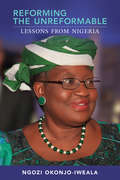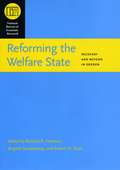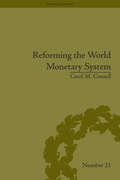- Table View
- List View
Reforming Government Subsidies in the New Member States of the European Union
by Alex Segura-Ubiergo Taline Koranchelian Carlos Mulas-GranadosA report from the International Monetary Fund.
Reforming Indian Agriculture: Towards Employment Generation and Poverty Reduction Essays in Honour of G K Chadha
by Sankar Kumar BhaumikThis compilation includes original essays that examine past and current status of the agricultural sector in India and delineate the challenges it faces in the era of economic reforms. It highlights the issues that are beginning to raise serious policy discussions in India in view of continuing agrarian crisis and the Eleventh Five Year Plan (2007–2012). Apart from providing macro level analyses, the collection also features studies which are based on micro (field) data that reflect the realities of the Indian agrarian economy. In addition, Reforming Indian Agriculture: Towards Employment Generation and Poverty Reduction focuses on the issues of employment, poverty, food and nutrition, and reviews other aspects of development policy like fostering inter-state cooperation for optimum utilization of resources, privatization policy to mobilize funds for social sector development and pattern of adoption of improved technologies by small scale industries in the country. The book will be invaluable for students, researchers and academicians working in the fields of Development Economics, Rural and Agricultural Economics, and Development Policy Analysis.
Reforming Institutions in Water Resource Management: Policy and Performance for Sustainable Development
by Vasant P. Gandhi Lin CraseAs water scarcities increase, nations throughout the world are in search of better institutions to manage water resources. India has been making substantial efforts to develop its water management systems since independence and significant increases in irrigated agriculture have taken place through both public and private initiatives. However, scarcities are increasing and major problems presently confront the management of water resources and irrigated agriculture. Resolving these problems is crucial for the future. The main purpose of this book is to provide a new approach for the analysis and design of water institutions that govern the use and development of water resources, particularly for agriculture which is the largest user. Drawing on the theory of New Institutional Economics and comparisons with Australia (as a developed country) and other less developed nations in Africa and Asia, the authors present original empirical data from three Indian states. Detailed analysis of these data is used to identify and recommend attributes and features of water management institutions that are conducive to effective resource management, its long-term success, and its best contribution to development.
Reforming Land and Resource Use in South Africa: Impact on Livelihoods (Routledge ISS Studies in Rural Livelihoods #8)
by Paul HebinckThis book debates the emergent proprieties of rural and peri-urban South Africa since land and agrarian reforms were initiated after the transition to democracy in 1994. It explores how these reforms have broadened options for the use of land and natural resources. Reform-minded policies in South Africa have assumed that if access to land and other natural resources is less problematic, the use of these resources would be intensified which in turn would alter the structure and dynamic of rural and urban poverty. Reforming Land and Resource Use in South Africa examines in detail, and from several disciplinary perspectives, whether and how this has occurred, and if not, why not. A key argument that this collection pursues is whether land reform has resulted in transformed use of natural (i.e. land, crops, cattle, rangeland, wild products etc.) and other strategic resources (labour, knowledge, institutions, networks etc.), and the value communities and household place on them. The contributions explore a combination of new or alternative meanings of land, including a look beyond crops and cattle per se to include the collection and selling of wild products, as well as a discussion of how land for agriculture has become redefined by land reform beneficiaries as urban land, for settlement and urban employment opportunities, in addition to urban-based agricultural activities. Unlike most analyses and commentaries on land reform, this book pursues an analysis of land reform dynamics at various levels of aggregation. National and regional level analyses of poverty and the ramifications of the property clause are combined with analyses at disaggregate levels such as the land reform project or village. The book will be of interest to both researchers and policy makers with an interest in rural development and social change.
Reforming Mexico's Agrarian Reform (Columbia's University Seminars Ser.)
by Laura RandallThis work provides a survey and analysis of Mexico's agrarian reform, covering topics such as the agricultural provisions of NAFTA. The book also discusses the events in Chiapas that are crucial to Mexico's current political situation and the implications of reform for US-Mexican trade.
Reforming Money and Finance: Institutions and Markets in Flux
by Robert GuttmannThis work provides a guide to money and finance. The second edition highlights the changes that have taken place in the period since 1988, including the banking crises of the early 1990s.
Reforming Occupational Licensing in the US: Reducing Social Costs and Increasing Social Benefits in the Legal, Medical, and Financial Services Professions
by Clifford WinstonNearly one-third of US workers must obtain a license from a government agency to perform their jobs legally. This impacts employees across all areas, including lawyers, doctors, and accountants, as well as florists, hairdressers, physical therapists, and plumbers. The justification for occupational licensing is that potential consumers allegedly lack the information and knowledge to judge the competence of a service provider. This necessitates a licensing system built to ensure that customers are served by people who have received adequate training and certification in their profession. While there are recognizable benefits of occupational licensing, the training and certification requirements create barriers to entry for employees or those entering the profession. These barriers can limit competition, raise service costs, and restrict consumer access to essential services. Recent empirical work suggests that consumers have incurred these costs without being adequately protected from incompetent or unscrupulous service providers. This book addresses this situation head on. In light of occupational licensing's shortcomings, the authors of this book propose and analyze constructive reforms, assessing their effects on key professions such as law, medicine, and finance. Chapters identify the significant costs of current policies and they recommend practical reforms that rely more on market forces. The resulting book provides new ways to reduce licensing costs without compromising service quality.
Reforming Pensions in Developing and Transition Countries
by Katja HujoThis book moves beyond technical studies of pension systems by addressing the political economy of pension reform in different contexts. It provides insights into key issues related to pension policy and its developmental implications, drawing on selected country studies in Africa, Asia, Eastern Europe, the Middle East, and Latin America.
Reforming Severance Pay
by Milan Vodopivec Robert HolzmannSeverance pay, a program that provides compensation to workers on termination of employment, is the most widely used income protection program for the unemployed--yet it is often blamed for creating economic inefficiencies such as reducing employment and limiting access to jobs for disadvantaged groups. Reforming Severance Pay: An International Perspective fills the knowledge gap in evaluating the international experience by providing a collection of worldwide overviews and labor market impact assessments, theoretical analyses, and country case studies. The authors summarize the performance of existing severance pay arrangements around the world and discuss recent innovative severance pay reforms in Austria, Chile, and the Republic of Korea. Reforming Severance Pay proposes policy directions based on country characteristics such as folding severance pay of higher income coun¬tries into existing social insurance programs and making severance pay a contractual affair between market partners to live up to the efficiency-enhancing device in a knowledge-based economy. For lower income countries, the authors advise reforming severance pay toward realistic benefit levels, strengthening compliance of benefit payments by the employer, and safeguarding minimum benefits. This report will be of interest to policy makers and researchers working on labor market, unemployment benefit, and pension issues; economic policy reform; poverty reduction; and social analysis and policy.
Reforming State-Owned Enterprises in Asia: Challenges and Solutions (ADB Institute Series on Development Economics)
by Naoyuki Yoshino Farhad Taghizadeh-Hesary Chul Ju Kim Kunmin KimThis book analyzes state-owned enterprises (SOEs), which are still significant players in many Asian economies. They provide essential public services, build and operate key infrastructure, and are often reservoirs of public employment. Their characteristics and inherent competitive advantages as publicly owned enterprises allow them to play these critical roles. Their weaknesses in governance and inefficiencies in incentive structures, however, also often lead to poor performance. SOEs must be efficient, transparent, and accountable to level the playing field for private companies, secure the growth of a vibrant private sector, and achieve sustained and inclusive economic growth. This book analyzes the reform of SOEs in Asia, the results of which are mixed. The volume concludes that some key conditions generally need to be met for SOE reforms to be successful: national bureaucracies must have the capacity to implement the reforms, and adverse impacts on international trade and investment must be avoided.
Reforming Turkish Energy Markets
by Tamer Cetin Izak Atiyas Gurcan GulenTurkey has been reforming its energy markets since the 1980s, culminating in two major bills in the early 2000s. The country has restructured electricity and natural gas markets, establishing an independent regulatory agency (EMRA) and passed legislation on renewable and nuclear energy. With these regulatory reforms, Turkey, as a candidate country for accession to the European Union (EU), has aimed to direct the energy markets to a more competitive environment in parallel with EU energy directives. This book contains an analysis of regulatory reforms in Turkish energy markets (electricity, natural gas, renewable and nuclear energy), the impact of these reforms on country's energy portfolio and role in global energy trade, especially between the EU, the Caspian, Caucasus, and Central Asia. Finally, the book concludes with recommendations for Turkish energy policy. The authors are expert scholars who have written extensively on Turkish regulatory reform and energy economics and who have broad knowledge of global energy market dynamics. The book will be a unique guide for those concerned with the different areas of the Turkish economy and international audiences interested in energy markets of Turkey and surrounding regions, making the book of interest to not only researchers in academia but also industry practitioners, regulators and policy makers as well.
Reforming U.S. Financial Markets: Reflections Before and Beyond Dodd-Frank (Alvin Hansen Symposium on Public Policy at Harvard University)
by Robert J. Shiller Randall S. KrosznerTwo top economists outline distinctive approaches to post-crisis financial reform.Over the last few years, the financial sector has experienced its worst crisis since the 1930s. The collapse of major firms, the decline in asset values, the interruption of credit flows, the loss of confidence in firms and credit market instruments, the intervention by governments and central banks: all were extraordinary in scale and scope. In this book, leading economists Randall Kroszner and Robert Shiller discuss what the United States should do to prevent another such financial meltdown. Their discussion goes beyond the nuts and bolts of legislative and regulatory fixes to consider fundamental changes in our financial arrangements. Kroszner and Shiller offer two distinctive approaches to financial reform, with Kroszner providing a systematic analysis of regulatory gaps and Shiller addressing the broader concerns of democratizing and humanizing finance. After brief discussions by four commentators (Benjamin M. Friedman, George G. Kaufman, Robert C. Pozen, and Hal S. Scott), Kroszner and Shiller each offer a response to the other's proposals, creating a fruitful dialogue between two major figures in the field.
Reforming UK Public Policy Through Elected Regional Government
by Malcolm J. ProwleThis book takes an in-depth look at the enormous challenges facing UK public services and considers what might be done to resolve them. The authors are confident that more of the same over-centralised approaches to public policy and so-called "levelling-up" policies will just not work. Instead, they argue for an application of radical measures, involving the creation of elected regional governments in England similar to the devolved arrangements in Wales, Scotland and Northern Ireland. The book comprises four distinct parts: introduction and context; the need for major reform; policies for individual public services and cross-cutting themes. Following an introduction and discussion of the meaning of the terms public policy and public services, the first part goes on to discuss at length the substantial challenges to public policy and public services. The second part sets out the need for over-arching reforms, designed to address the issues discussed above, namely the development of elected regional governments. Each chapter in part three explores key themes concerning individual public policy areas and public services, while part four discusses a number of themes, which cut across all the public services already considered. Although the book is focused on and is of great relevance within the UK, it also has international appeal, as many of the themes discussed will have resonance in other countries and the analysis of public policy in regional administrations will also be of interest in other jurisdictions. It will appeal to students and academics in the fields of government and politics, economics, finance and accounting, public administration, public service management and social policy, as well as policymakers, practicing civil servants, public service managers and elected representatives.
Reforming WTO Rules on State-Owned Enterprises: In The Context Of Soes Receiving Various Advantages
by Yingying WuThis book argues that the trade-distorting effects of advantages associated with SOEs are more severe from an economic perspective, and the behavior of SOEs after receiving advantages is of more concern, compared to private-owned enterprises (POEs). The premise is that the existence of SOEs per se is not the essential problem; rather, the underlying problems are (i) the disproportionate granting of advantages to SOEs (compared to POEs) and (ii) the behavior of SOEs once they receive advantages. The book offers a systematic analysis focusing on the various advantages granted to SOEs and their subsequent behavior. Its detailed analysis reveals the inadequacy of current WTO rules and is complemented by a number of concrete proposals.
Reforming Water Law and Governance: From Stagnation To Innovation In Australia
by Cameron Holley Darren SinclairThis book identifies the most effective water policy tools and innovations, and the circumstances that foster their successful implementation by taking a comparative look at a world-leading ‘laboratory’ of water law and governance: Australia. In particular, the book analyses Australia’s 20-year experience implementing a hybrid governance system of markets, hierarchical regulation, and collaborative integrated water planning. Australia is acknowledged as a world leader in water governance reform, and an examination of its relatively mature water law and governance system has great significance for many international academics and jurisdictions. This book synthesises practical lessons and theoretical insights from Australia, as well as recommendations from comparative analysis with countries such as the United States to provide useful guidance for policymakers and scholars seeking to apply water instruments in a wide range of policy contexts. The book also advances our understanding of water and broader environmental governance theory and is a valuable reference for scholars, researchers and students working in law, regulation and governance studies – especially in the field of water and environmental law.
Reforming the Chinese Electricity Supply Sector: Lessons from Global Experience
by Michael G. PollittThe Chinese electricity sector is the largest in the world, covering well over 20% of the world's electricity supply. While many other countries liberalized their electricity systems in the 1990s, thereby creating competitive wholesale and retail electricity markets, China’s move towards liberalization has advanced at a slower pace – until now. Following the China State Council's publication of the No. 9 document on 'Deepening Reform of the Power Sector', this book reflects on the ambitious new round of reforms aimed at introducing competitive wholesale electricity markets and incentive regulation for its power grids. Written in collaboration with Hao Chen, Lewis Dale and Chung-Han Yang, this book provides lessons for China’s reforms from international experience, combining a detailed review of reforms from around the world with specific application to China and focuses on how the industrial price of electricity is determined in a liberalized power system.
Reforming the Governance of the Financial Sector (Routledge International Studies in Money and Banking #74)
by Geoffrey Wood David G. MayesMany financial institutions have in recent years failed – failed either completely, and gone into bankruptcy, or failed in the sense that they have not achieved what their owners or their customers expected them to deliver. This has had significant and adverse effects on customers, taxpayers, shareholders, and sometimes management. There has been much discussion of what should be done about this, and some action has been taken. But has it been the right kind of action? Crises of the sort being experienced are low probability but high impact events. This volume, from an international group of scholars, deals with two main issues: firstly, how can the governance of the financial sector by the authorities be improved and secondly, how can the governance of firms and institutions within the sector be improved to render the probability and cost of future crises lower? Poor governance has been one of the major contributors to the global financial crisis. With better governance of and in the financial sector the financial crisis might well have been avoided altogether and certainly could have been much milder in its impact. This is not simply a case of being wise after the event. These problems were widely discussed before the event, but little action was taken. This book explores not only what the contribution of poor governance was to the crisis and to its depth, but also why it is often difficult to improve governance. The volume offers a positive critique of the measures that are being put in place in the light of the experience of the crisis and suggests how they might plausibly be improved. This book will be of particular interest to students and researchers of economics and international finance, but will also prove profitable reading for practitioners and the interested public.
Reforming the International Financial System for Development (Initiative for Policy Dialogue at Columbia: Challenges in Development and Globalization)
by Jomo Kwame SundaramThe 1944 Bretton Woods conference created new institutions for international economic governance. Though flawed, the system led to a golden age in postwar reconstruction, sustained economic growth, job creation, and postcolonial development. Yet financial liberalization since the 1970s has involved deregulation and globalization, which have exacerbated instability, rather than sustained growth. In addition, the failure of Bretton Woods to provide a reserve currency enabled the dollar to fill the void, which has contributed to periodic, massive U.S. trade deficits. Our latest global financial crisis, in which all these weaknesses played a part, underscores how urgently we must reform the international financial system. Prepared for the G24 research program, a consortium of developing countries focused on financial issues, this volume argues that such reforms must be developmental. Chapters review historical trends in global liquidity, financial flows to emerging markets, and the food crisis, identifying the systemic flaws that contributed to the recent downturn. They challenge the effectiveness of recent policy and suggest criteria for regulatory reform, keeping in mind the different circumstances, capacities, and capabilities of various economies. Essays follow ongoing revisions in international banking standards, the improved management of international capital flows, the critical role of the World Trade Organization in liberalizing and globalizing financial services, and the need for international tax cooperation. They also propose new global banking and reserve currency arrangements.
Reforming the International Monetary and Financial System
by Peter B. Kenen Alexander K. SwobodaThe IMF's Research Department convened a conference in 1999 to discuss the key issues of international monetary and financial reform. It followed a period of turbulence in the worlds financial markets when a succession of crises had caused severe output loses in many emerging market economies. The need was to look at the architecture of the international financial system whilst the impetus for reform was still fresh. The main sections of the publication are : key issues of reform; maintaining stability under high capital mobility; the role of the International Monetary Fund.
Reforming the State Without Changing the Model of Power?: On Administrative Reform in Post-Socialist Countries
by Anton OleinikThis book places administrative reform in post-socialist countries in a broad context of power and domination. This new perspective clarifies the reasons why reforms went awry in Russia and some other post-Soviet countries, whereas they produced positive outcomes in the Baltic States and most East European countries. The contributors analyse the idea that administrative reform cannot produce sustainable changes in the organization of the state apparatus as long as it does not touch the underpinning model of power and domination. Using an interdisciplinary and comparative approach, the essays combine elements of philosophy, sociology, political science and economics, including a wealth of primary and secondary data: surveys, in-depth interviews with state representatives and participant observation. The book focuses on Russia and analyses recent developments in this country by the way of comparison with the experience of carrying out administrative reform in Ukraine, Bulgaria, Poland, Germany and North America.This book was published as a special issue of the Journal of Communist Studies and Transition Politics.
Reforming the U.S. Immigration Regime: A Polarizing Issue in a Polarized Era
by Marco E. TabelliniCase
Reforming the Unreformable: Lessons from Nigeria (The MIT Press)
by Ngozi Okonjo-IwealaCorrupt, mismanaged, and seemingly hopeless: that's how the international community viewed Nigeria in the early 2000s. Then Nigeria implemented a sweeping set of economic and political changes and began to reform the unreformable. This book tells the story of how a dedicated and politically committed team of reformers set out to fix a series of broken institutions, and in the process repositioned Nigeria's economy in ways that helped create a more diversified springboard for steadier long-term growth. The author, Harvard- and MIT-trained economist Ngozi Okonjo-Iweala, currently Nigeria's Coordinating Minister for the Economy and Minister of Finance and formerly Managing Director of the World Bank, was a crucial player in her country's economic reforms. In Nigeria's Debt Management Office and later as minister of finance, she spearheaded negotiations with the Paris Club of Creditors that led to the cancellation of sixty percent of Nigeria's external debt. Reforming the Unreformable offers an insider's view of those debt negotiations; it also details the fight against corruption and the struggle to implement a series of macroeconomic and structural reforms. Nigeria's efforts can be viewed as a laboratory for other countries--not just resource-rich developing countries like Nigeria, but any country interested in reining in debt, managing volatility, saving for the future, or building credibility with debtors and investors. This story of development economics in action, written from the front lines of economic reform in Africa, offers a unique perspective on the complex and uncertain global economic environment.
Reforming the Unreformable: Lessons from Nigeria (The\mit Press Ser.)
by Ngozi Okonjo-IwealaA report on development economics in action, by a crucial player in Nigeria's recent reforms.Corrupt, mismanaged, and seemingly hopeless: that's how the international community viewed Nigeria in the early 2000s. Then Nigeria implemented a sweeping set of economic and political changes and began to reform the unreformable. This book tells the story of how a dedicated and politically committed team of reformers set out to fix a series of broken institutions, and in the process repositioned Nigeria's economy in ways that helped create a more diversified springboard for steadier long-term growth. The author, Harvard- and MIT-trained economist Ngozi Okonjo-Iweala, currently Nigeria's Coordinating Minister for the Economy and Minister of Finance and formerly Managing Director of the World Bank, played a crucial part in her country's economic reforms. In Nigeria's Debt Management Office, and later as Minister of Finance, she spearheaded negotiations with the Paris Club that led to the wiping out of $30 billion of Nigeria's external debt, 60 percent of which was outright cancellation. Reforming the Unreformable offers an insider's view of those debt negotiations; it also details the fight against corruption and the struggle to implement a series of macroeconomic and structural reforms. This story of development economics in action, written from the front lines of economic reform in Africa, offers a unique perspective on the complex and uncertain global economic environment.
Reforming the Welfare State: Recovery and Beyond in Sweden
by Richard B. Freeman Birgitta Swedenborg Robert H. TopelOver the course of the twentieth century, Sweden carried out one of the most ambitious experiments by a capitalist market economy in developing a large and active welfare state. Sweden's generous social programs and the economic equality they fostered became an example for other countries to emulate. Of late, Sweden has also been much discussed as a model of how to deal with financial and economic crisis, due to the country's recovery from a banking crisis in the mid-1990s. At that time economists heatedly debated whether the welfare state caused Sweden's crisis and should be reformed--a debate with clear parallels to current concerns over capitalism. Bringing together leading economists,Reforming the Welfare State examines Sweden's policies in response to the mid-1990s crisis and the implications for the subsequent recovery. Among the issues investigated are the way changes in the labor market, tax and benefit policies, local government policy, industrial structure, and international trade affected Sweden's recovery. The way that Sweden addressed its economic challenges provides valuable insight into the viability of large welfare states, and more broadly, into the way modern economies deal with crisis.
Reforming the World Monetary System: Fritz Machlup and the Bellagio Group (Financial History #21)
by Carol M ConnellFocusing on Fritz Machlup, Connell presents the story of the Bellagio Group and its contribution to modern finance. Initiated by Machlup the Bellagio Group was made up of thirty-two non-government academic economists. During the years between 1964 and 1977 the Group met eighteen times and made a series of recommendations for policymakers.

